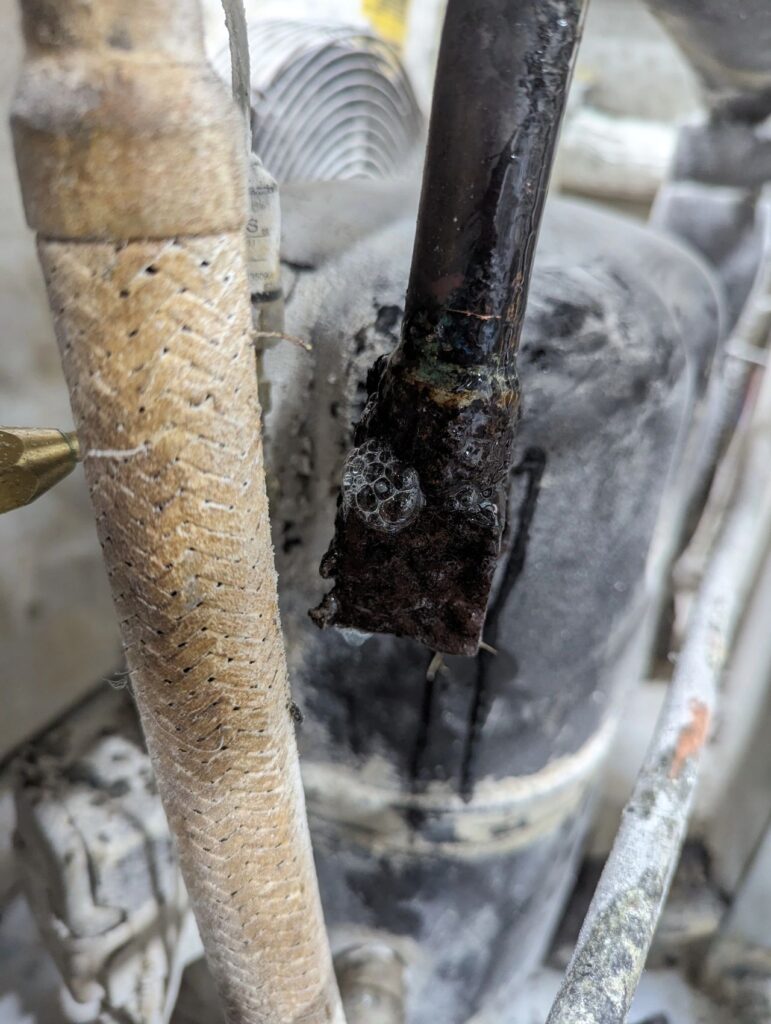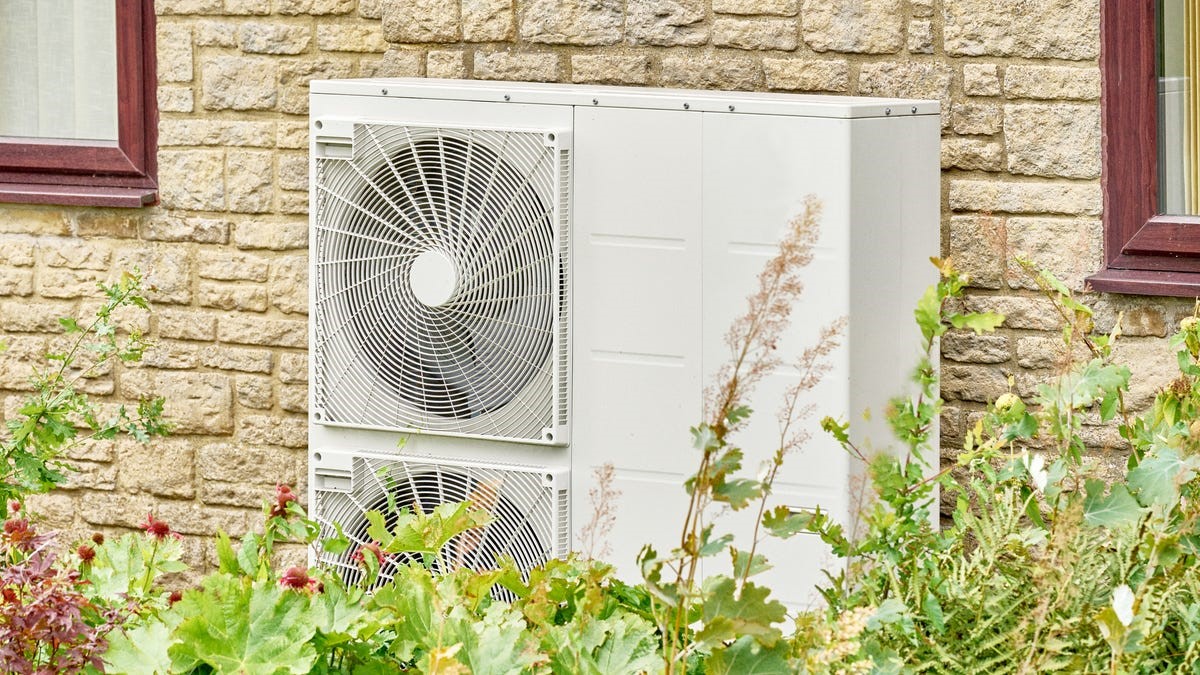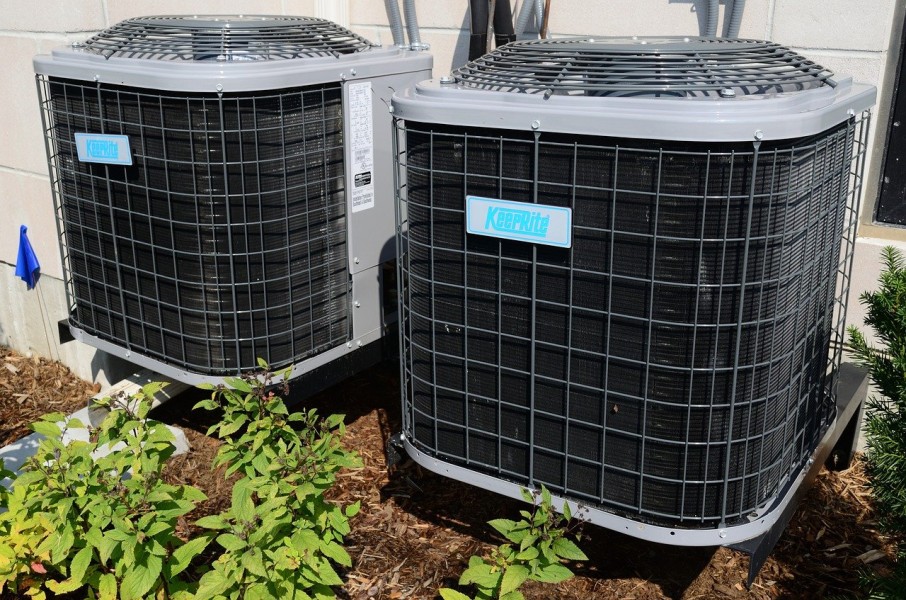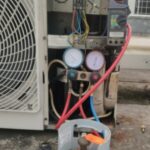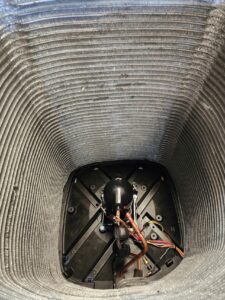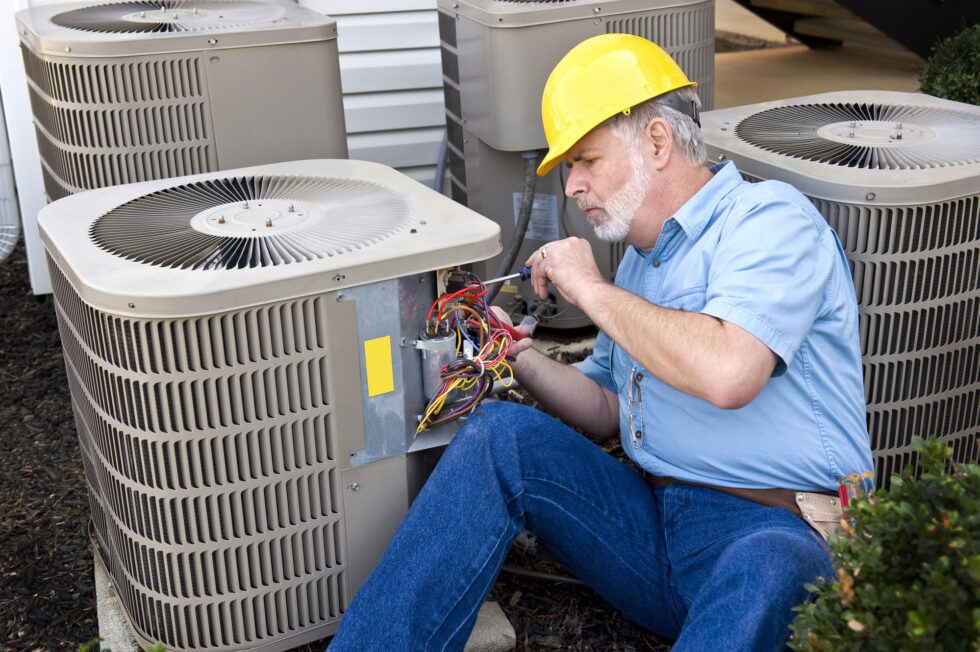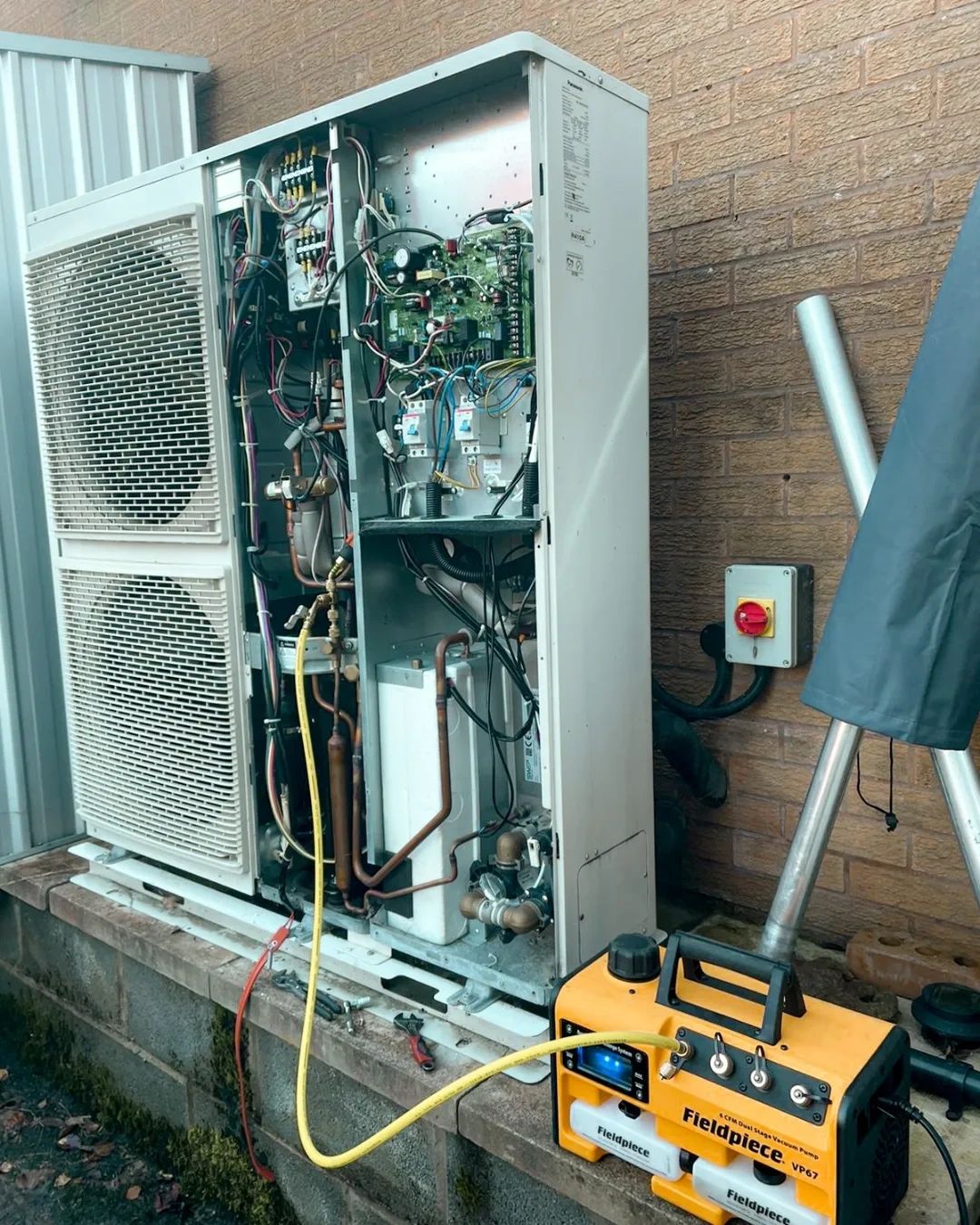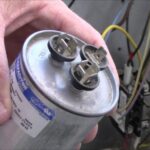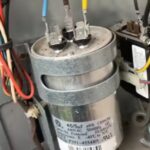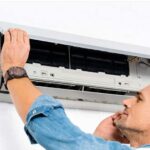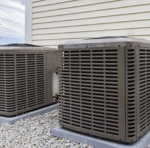AC refrigerant is a key substance in air conditioners, crucial for the cooling process by absorbing heat from indoors and releasing it outdoors. “Freon” is a brand name historically used for various refrigerants and has become a generic term for AC refrigerants, despite being associated with environmental harm and being phased out for safer alternatives like R-410A. The terms are used interchangeably because Freon was once so widespread that it became synonymous with all types of refrigerant, much like using “Kleenex” for any tissue. However, modern AC systems use environmentally friendly refrigerants to minimize impact on the ozone layer.Top of Form
Freon Leaks in AC System
Detecting refrigerant leak in ac unit system can be challenging for most homeowners. Typically, leak in AC occur through tiny, hard-to-spot openings, releasing Freon as a gas, which is invisible to the eye. Here’s how to identify potential refrigerant leaks and the steps to take for confirmation.
Initial Symptoms and signs of Air conditioner Freon leak or AC Refrigerant Leak:
How do I know if my AC is leaking Freon? The answers below can indicate that AC freon is leaking but also can indicate other Aircon issues
- Warm air blowing from your AC, indicating it’s not cooling properly.
- Rising utility bills, suggesting the AC is working harder to maintain cool temperatures.
- An unusually quiet air conditioner, as it fails to cycle refrigerant effectively.
- Lack of airflow from the vents.
Identifying a Freon leak on your own can be complex, as these symptoms can also indicate other AC issues.
Key signs and symptoms of AC unit refrigerant leak or Freon Leak:
How do I know if my AC is leaking Freon? These are the major signs and symptoms of AC refrigerant leak
- Hissing sounds from the AC unit, a strong indicator of a leak.
- Ice formation on the evaporator coil or refrigerant lines, a sign of low refrigerant levels causing the coil to freeze over.
- Visible damage or corrosion on pipes, which may suggest a leak is present.
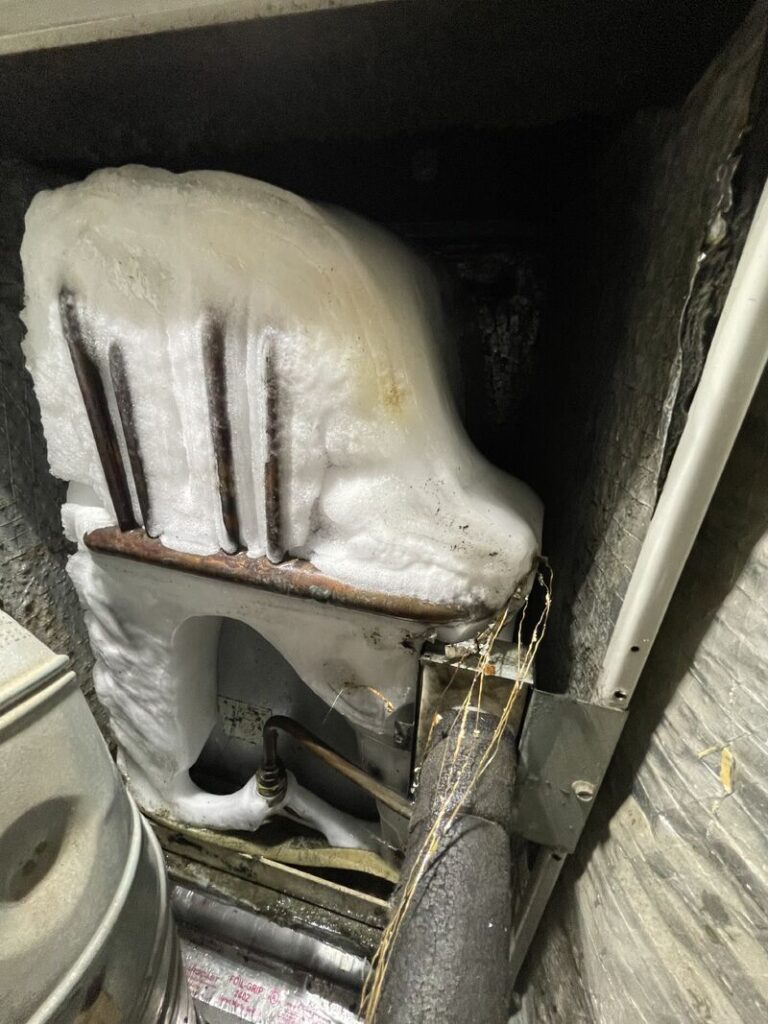
Coils in your AC should be cold but never frozen. Freezing can occur when there’s insufficient refrigerant, drastically lowering pressure and temperature within the system.
Professional Diagnosis and Repair for A C leak:
If you suspect a refrigerant leak or face any AC problems, call HVAC maintenance company for help. These companies have technicians that are equipped to:
- Measure refrigerant pressure and temperature changes, crucial for identifying the presence of a leak.
- Inspect for typical leak patterns, assisting in pinpointing the exact issue.
- Fixing and repairing the point where the refrigerant is leaking from.
The technicians uses a comprehensive approach to diagnose and resolve refrigerant leak in aircon, ensuring your AC system operates efficiently and your home remains comfortable.
Brazing steel to copper using a 45percent silver and flux combination on an old suction service valve having AC leak or leaking refrigerant at rusted body.
It’s more of a soldering than a brazing application and too much heat will be generated during the work
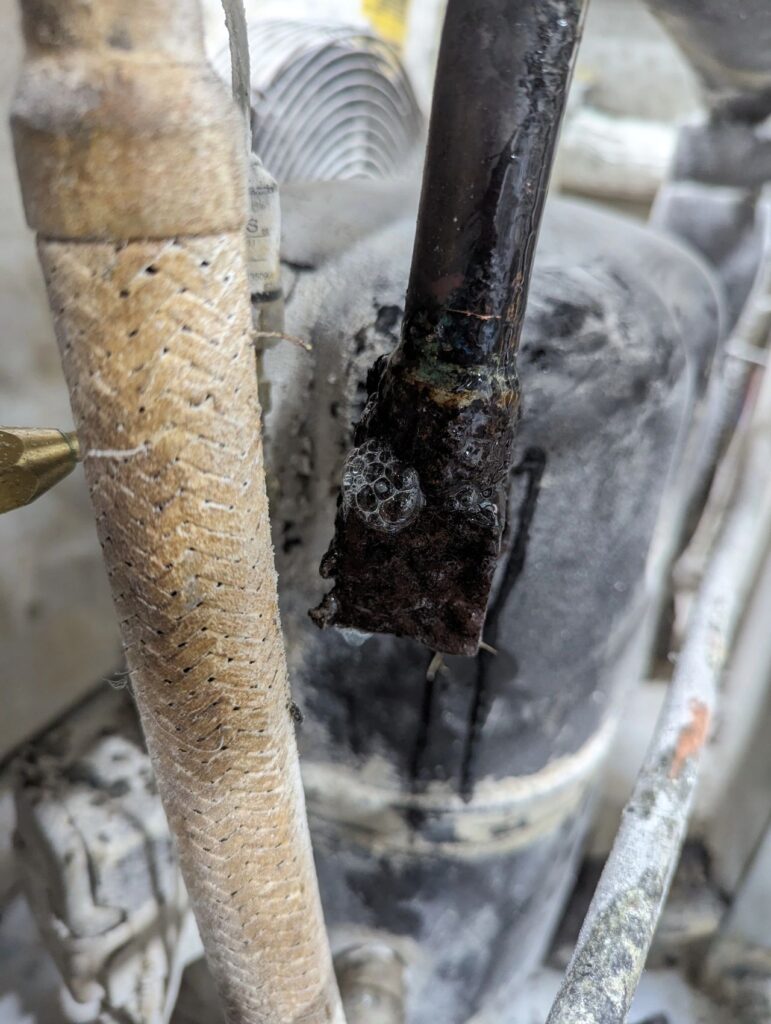
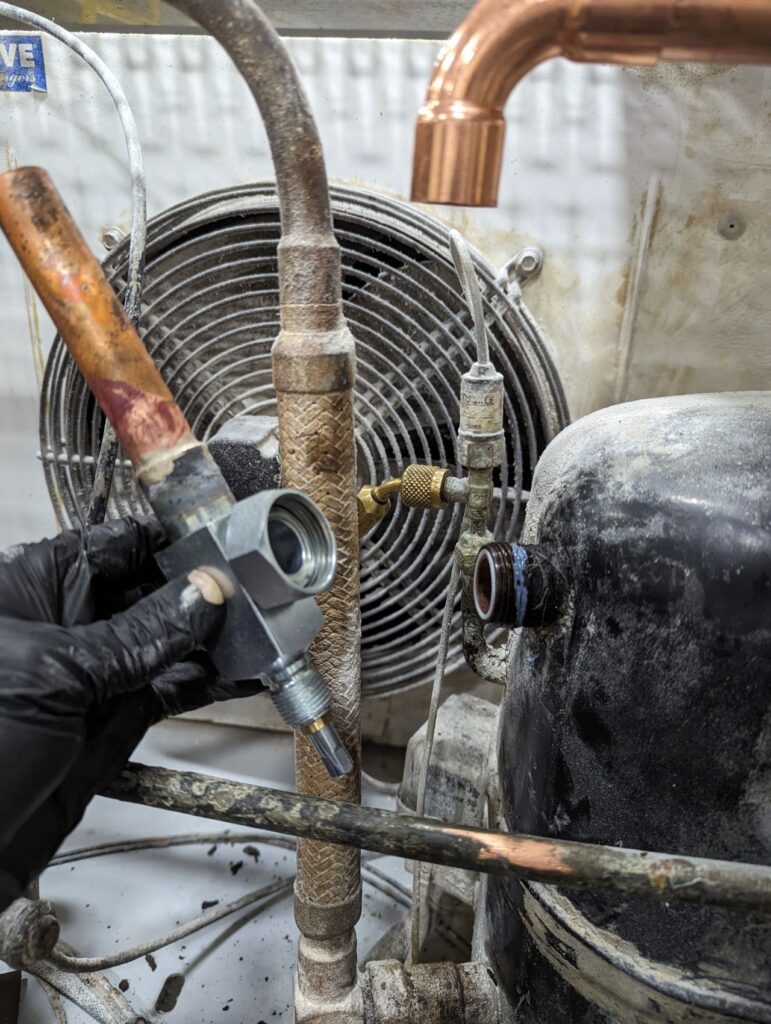
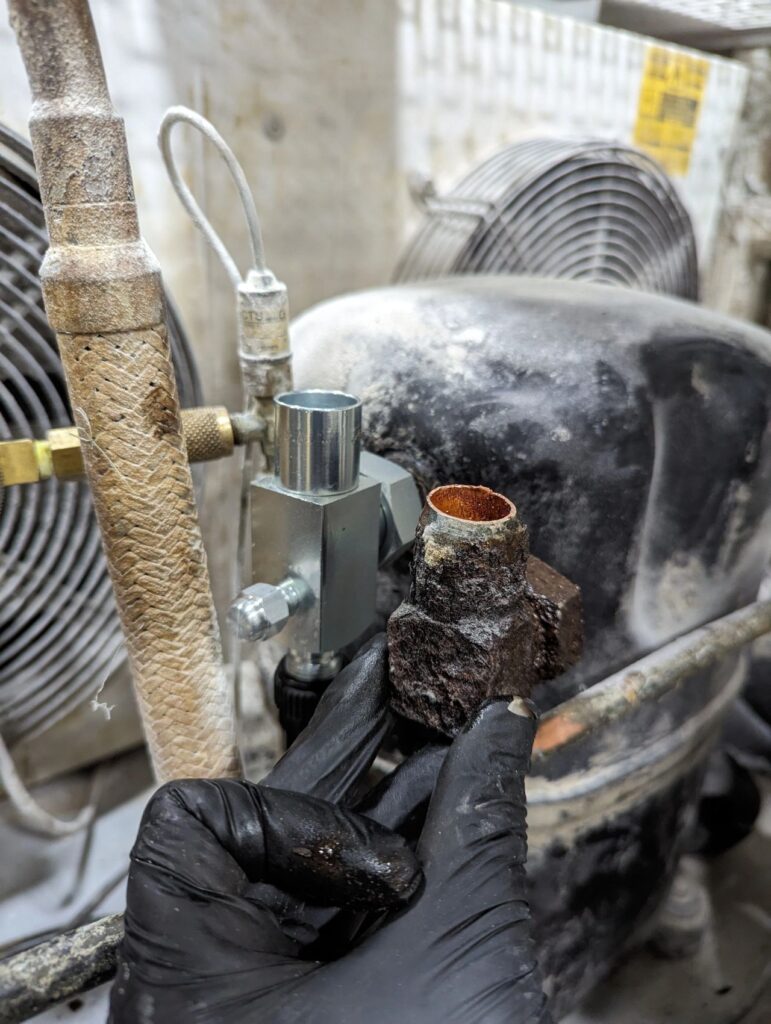
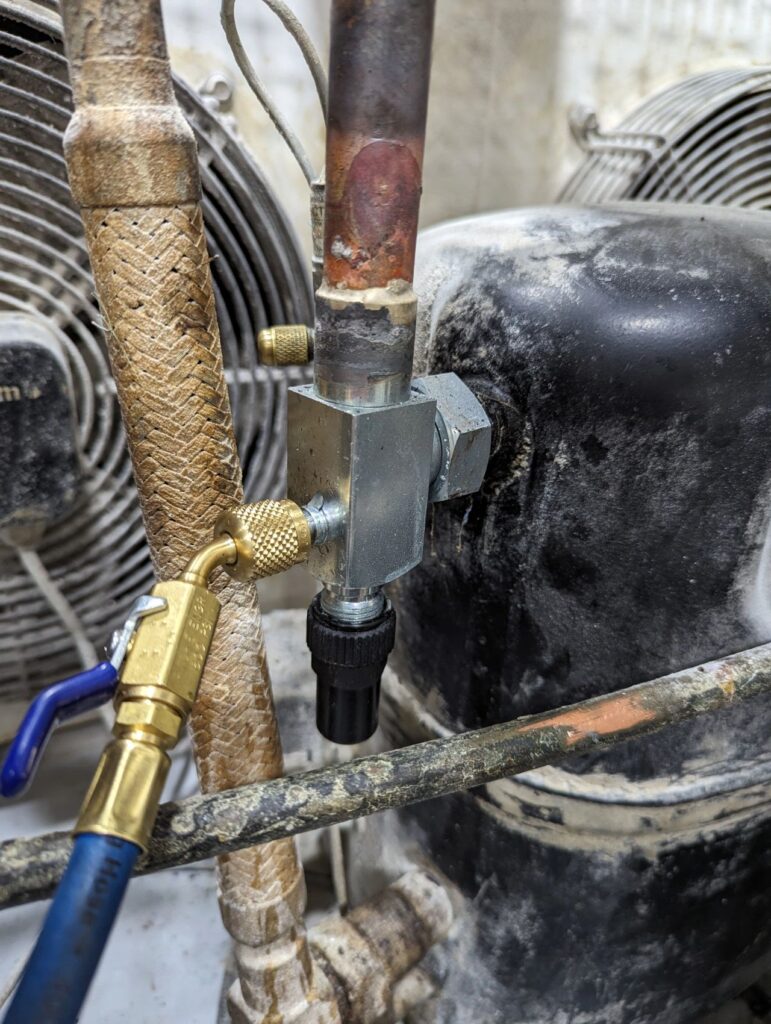
AC Freon leaking at the tube flaring, the tube was cut and new flaring done using flaring machine
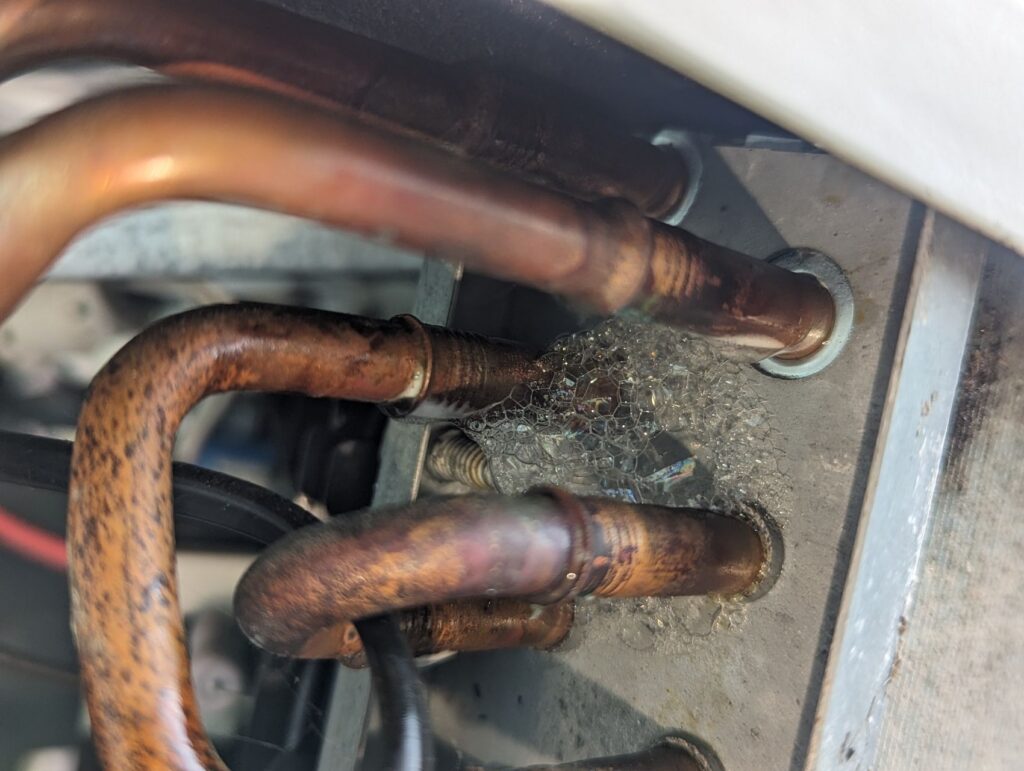
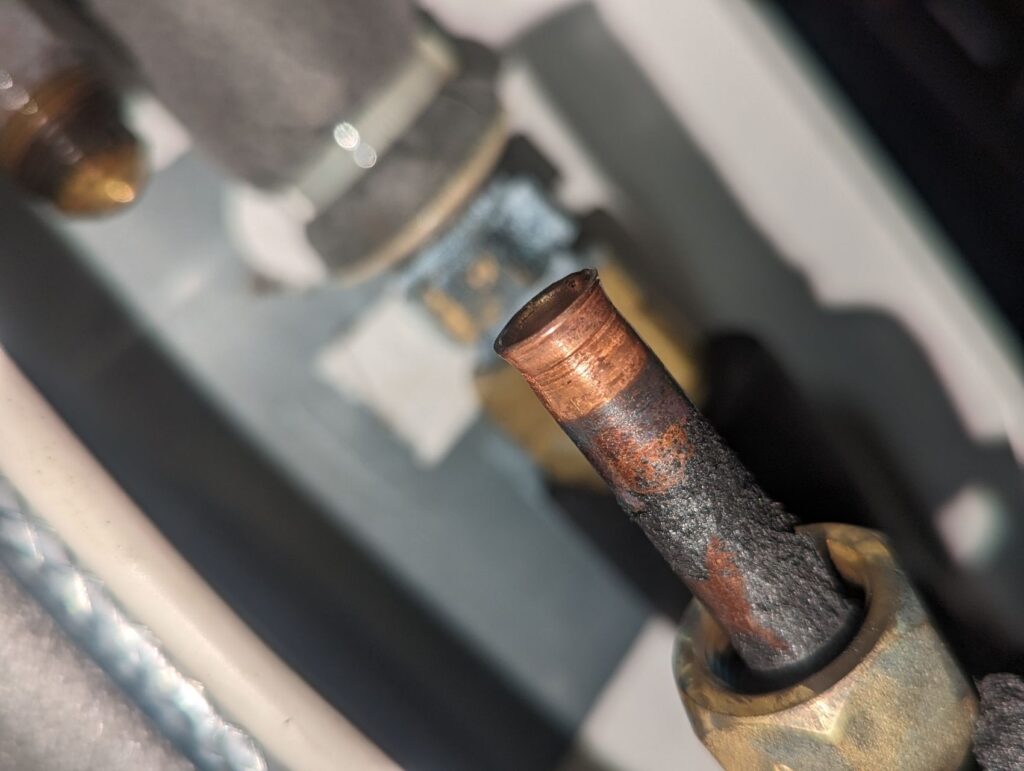
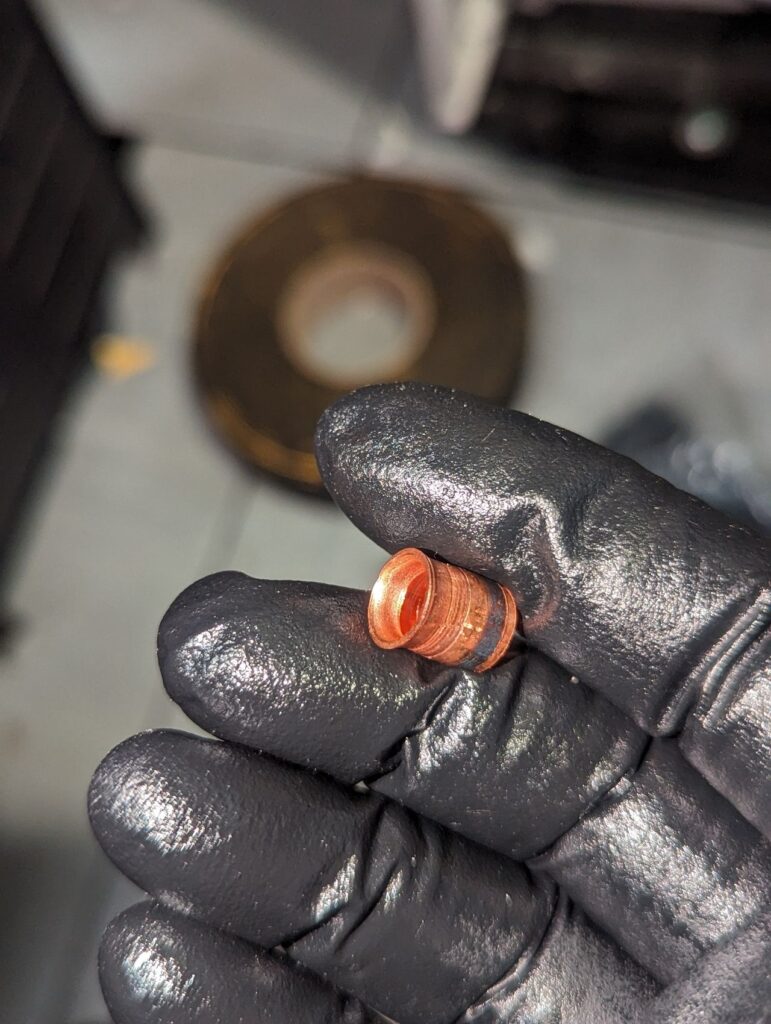
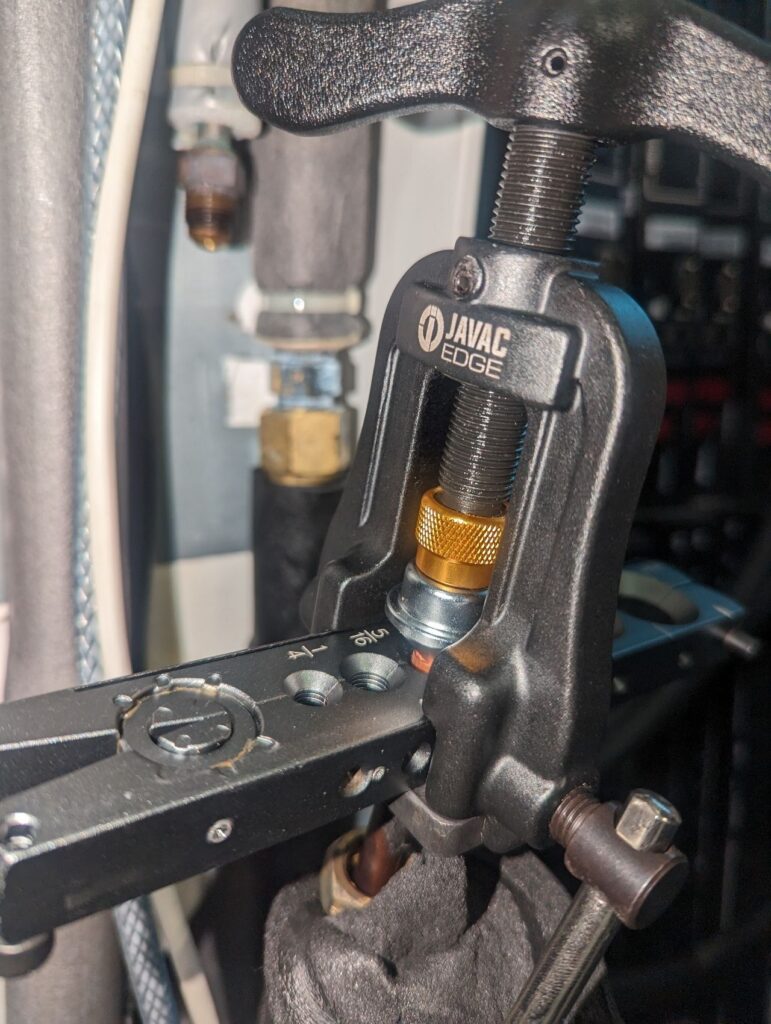
what causes refrigerant leaks in air conditioner and where do they occur
AC refrigerant leaks often occur at pipe joints and fittings or welds where there’s weakness or excessive vibration. These areas are prone to leaks due to stress or corrosion, so it’s crucial to inspect them for any signs of damage or strain.
When delving into the intricacies of air conditioning (AC) systems, understanding where and why refrigerant leaks occur is crucial for maintenance and efficiency. Refrigerant, the lifeblood of any AC system, absorbs and releases heat to cool your home. However, leaks can undermine the system’s efficiency, leading to increased energy costs and potential damage. Here’s a detailed breakdown of common leak locations and their causes:
Where is the most common place for a Freon leak and their causes?
1. Common Weaknesses for AC Leaks:
Joints and Fittings:
These are critical junctures within the AC system where pipes connect. Over time, the constant flow of refrigerant and exposure to temperature fluctuations can weaken these connections, making them susceptible to air conditioning refrigerant leak. Additionally, the mechanical stress from vibrations, especially in systems that are not securely mounted, can exacerbate these weaknesses.
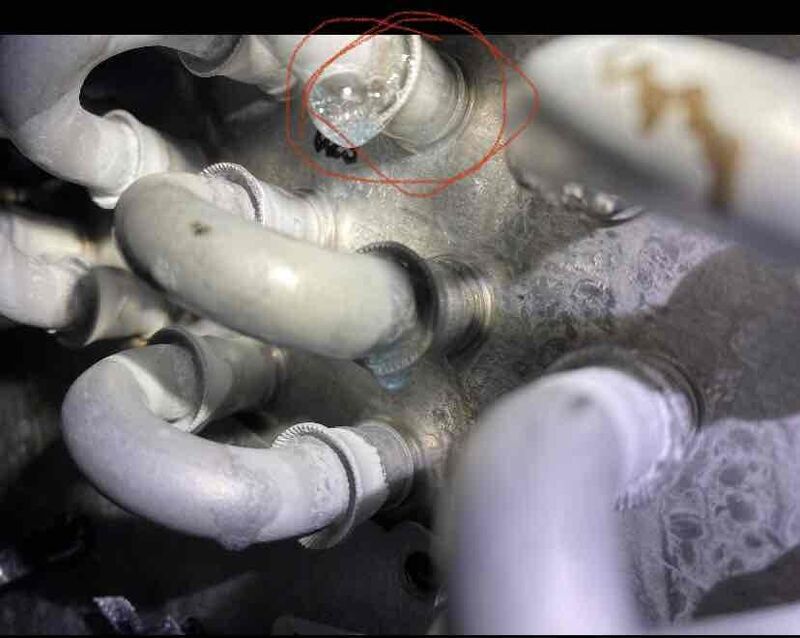
Welds and Corrosion:
Welded areas are particularly prone to refrigerant leak in aircon due to the potential for corrosion. Corrosive substances, whether from environmental exposure or chemical reactions within the system, can eat away at the metal, forming weak spots through which refrigerant can escape.
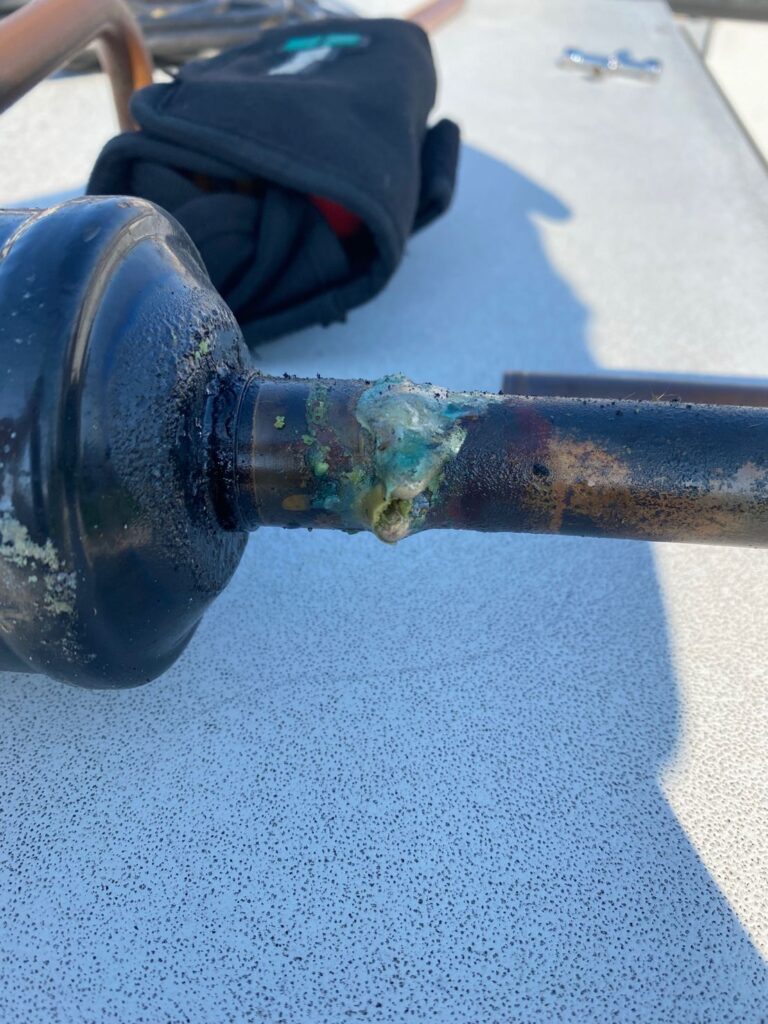
Excessive Vibration:
AC components, particularly those in or near the compressor and outdoor units, can experience significant vibration during operation. Over time, this vibration can cause physical stress on the system, leading to fractures at joints, welds, or even in the body of the pipes themselves leading to air conditioner leaking refrigerant
2. Specific Locations where AC leak occur:
Where is the most common place for a Freon leak?
Schrader Valves:
These valves, similar to those on a car tire, allow technicians to access the system for maintenance, such as checking pressure levels or adding refrigerant. The valves have rubber seals that can degrade and crack over time, leading to leaks. Corrosion from environmental exposure or chemical reactions within the system can also compromise the valve integrity.
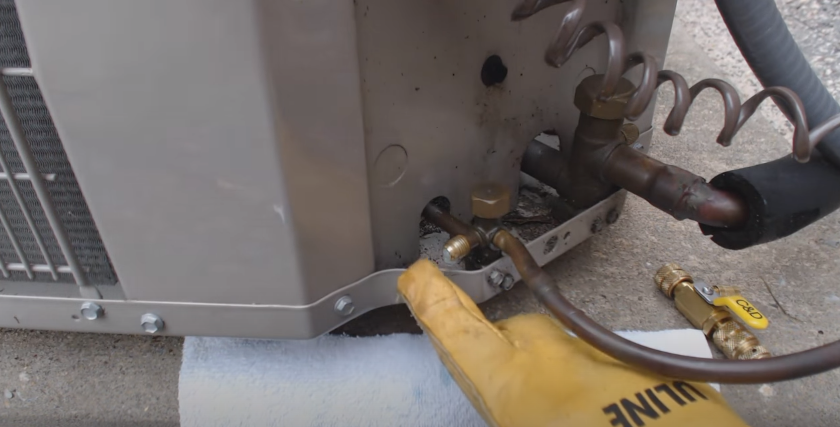
Evaporator Coil:
Positioned in the indoor unit, the evaporator coil is a common site for leaks. The “U” bends and welded joints are particularly vulnerable due to the high pressure and temperature fluctuations experienced during the cooling cycle. The constant condensation and evaporation can also contribute to corrosion, further increasing the risk of leaks.
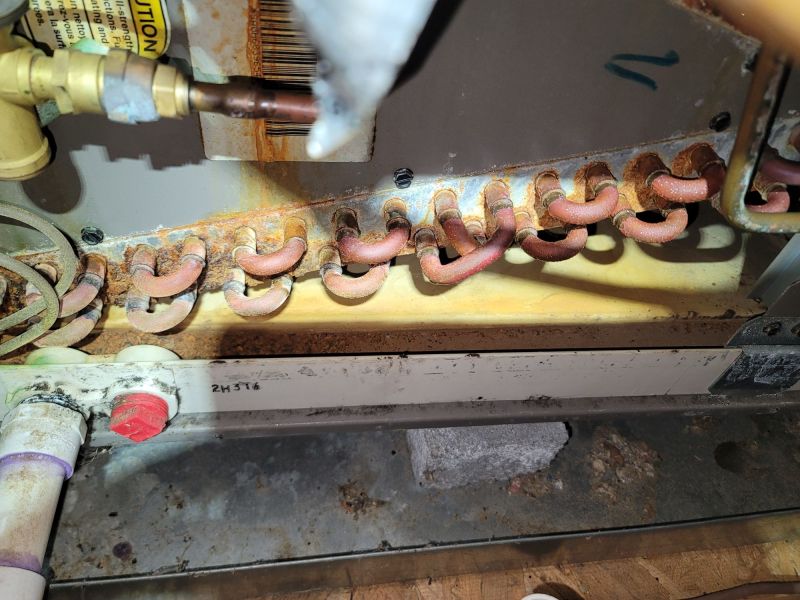
Condenser Coils (Outdoor):
The outdoor unit’s condenser coils can develop leaks from excessive vibration, either from improper installation or environmental factors like wind or seismic activity. These coils are also exposed to the elements, making them susceptible to corrosion from rain, snow, or even salt in coastal areas.
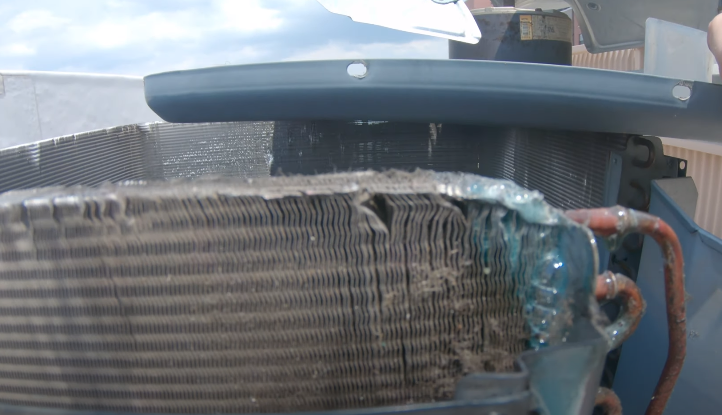
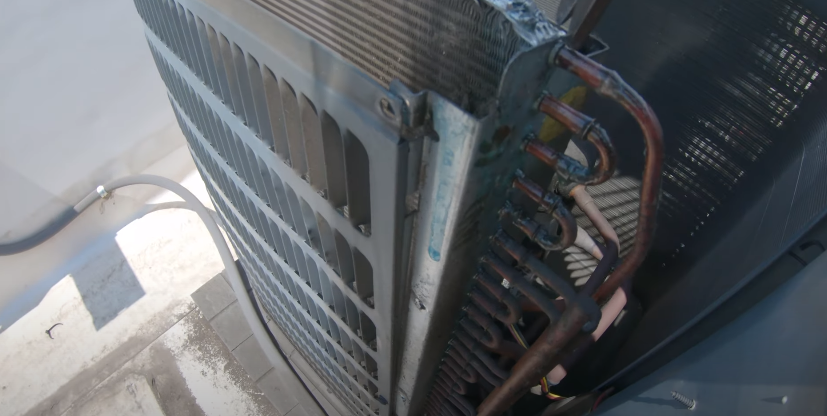
Linesets:
These copper tubes run between the indoor and outdoor units, carrying refrigerant through the system. Leaks here can be due to several factors, including physical damage, corrosion, or stress from improper support. It’s essential to inspect these lines thoroughly, as leaks can occur anywhere along their length.
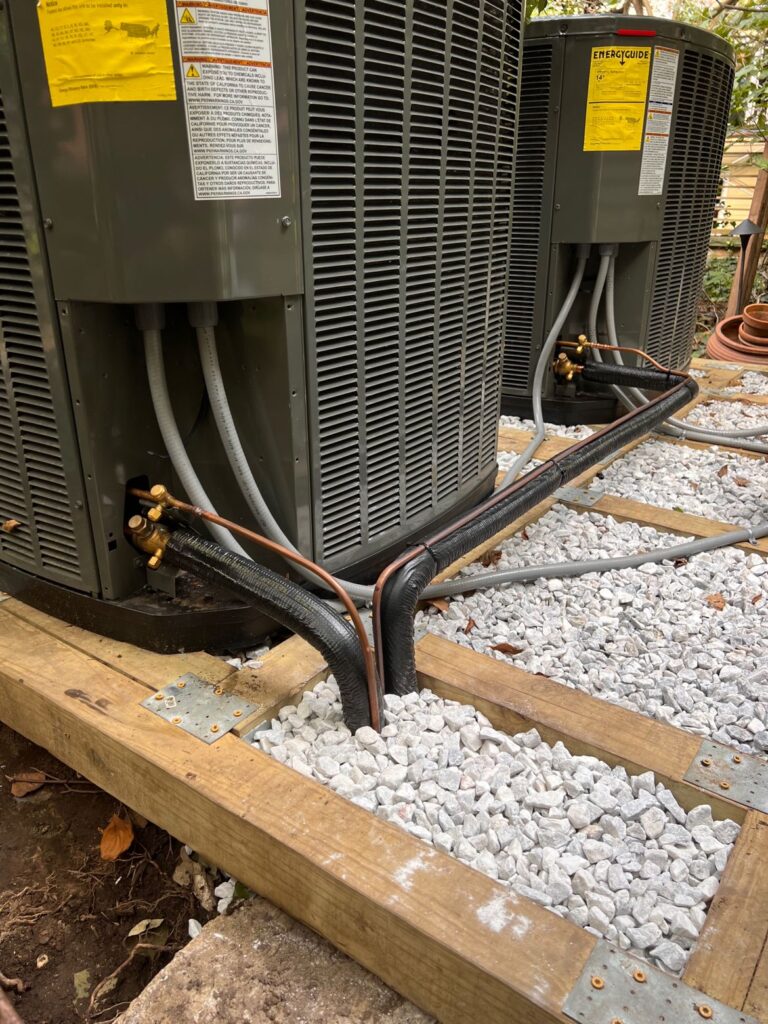
Heat Pump Condenser Accumulator:
In systems with long refrigerant lines, this component acts as a safeguard, collecting excess liquid refrigerant to prevent it from entering the compressor, which could cause damage. Made typically of steel, accumulators are prone to rust and corrosion over time, which can lead to leaks.
Prevention and Maintenance:
To prevent leaks and maintain system efficiency, regular maintenance is key. This includes:
- Regular Inspections: Professional HVAC technicians can identify early signs of wear and tear, potential stress points, and areas susceptible to corrosion.
- Proper Installation and Support: Ensuring that all components are securely mounted and supported can reduce the risk of leaks due to vibration and stress.
- Environmental Protection: In areas prone to high corrosion risk, additional protective measures, such as coatings or enclosures, can help extend the life of the components.
Understanding these common leak locations and causes can help homeowners and maintenance personnel take proactive steps to maintain their AC systems, ensuring efficient operation and prolonging their lifespan.
how to check for freon leak in home AC?
how to find a freon leak in ac unit?
To find leaks in an air conditioning (AC) system, technicians have several methods at their disposal, each tailored to different scenarios and types of leaks. Here’s a detailed explanation of these methods:
- Visual Inspection for Oil Residue:
- This method involves looking for signs of oil that may have leaked out along with the refrigerant. Since refrigerant oil circulates with the refrigerant through the AC system, any leaking point might also show oil stains or residue. This is more apparent with refrigerants that are oil-based, providing a visual clue to the technician about where the system might be leaking.
- Soapy Water Test:
- A simple yet effective approach involves applying a soapy water solution to parts of the AC system suspected of leaking. If there’s a leak, the escaping refrigerant gas will create bubbles in the soapy water, visually indicating the leak’s location. This method is straightforward and can be particularly useful for finding leaks in accessible areas like joints and connections.
- Electronic Leak Detection:
- Technicians use a specialized tool called an electronic leak detector, which is designed to sense the presence of refrigerant gas in the air. When the detector is passed over areas suspected of leaking, it will alert the technician to the presence of refrigerant gas, indicating a leak. This method is highly effective for detecting even small quantities of escaping gas.
- Nitrogen Pressure Test:
- In this method, the technician first ensures the AC system is devoid of refrigerant. Then, they fill the system with nitrogen—a non-flammable, non-reactive gas—under pressure. The high pressure inside the system forces gas out through any leaks, which can then be detected using soapy water (as in the soapy water test) or by listening for the hissing sound of escaping gas. This method is useful for finding leaks in a system that has been emptied of its refrigerant.
- Fluorescent Dye Method:
- Considered one of the most thorough methods for leak detection, this involves adding a special fluorescent dye to the refrigerant. Over a period (typically about two weeks), the dye circulates with the refrigerant. Afterward, a technician uses a UV light to inspect the system. The dye, visible under the UV light, will have leaked out at any leaking points, glowing brightly and revealing the locations of even minor leaks.
Each of these methods has its advantages and is chosen based on the specific situation, the type of system being inspected, and the nature of the suspected leaks.
How much does it cost to repair a refrigerant leak in the AC?
Cost of fixing Freon leak in air conditioner
Fixing a refrigerant leak in an air conditioning (AC) system can cost between $200 and $1,500 on average. This wide range in cost depends on several factors, including how quickly the leak is found, the specific part of the system that needs repair or replacement, and whether that part is under warranty. Leaks that are easily accessible and require simple repairs tend to be on the lower end of the cost spectrum, while those requiring replacement of major components like the evaporator coil, condenser coil, or lineset can be much more expensive, especially if the parts are out of warranty.
Cost of AC Refrigerant Leak Repairs
Repairing a leak in your air conditioning (AC) system can vary significantly in cost, depending on the type of leak and various factors involved. Here’s a simplified breakdown to help you understand the potential expenses:
Factors Influencing Refrigerant Leak Repair Costs:
- Type of Leak: Different types of leaks, such as Freon or water leaks, have varying repair costs.
- Extent of Damage: The severity of the leak and the extent of damage to the AC system components affect repair expenses.
- Accessibility: Accessibility to the leak site influences repair complexity and labor costs.
- Part Replacement: Repair costs may vary based on whether specific components, such as the evaporator coil or lineset, require repair or complete replacement.
- Warranty Coverage: Warranty coverage for AC system parts can significantly impact repair expenses, with warranty-covered parts reducing out-of-pocket costs.
- Technician Efficiency: The time taken by technicians to diagnose and repair the leak affects overall repair costs.
- Age of the System: Older AC units may require more extensive repairs or upgrades, potentially increasing repair costs.
- Regulatory Compliance: Compliance with EPA regulations for refrigerant handling and disposal can add to repair costs if not adhered to properly.
Explanation of Refrigerant Leak Repair Costs
1. Cost Based on Leak Type:
- Refrigerant Leaks: These can cost anywhere from $200 to $1,500 to fix. The reason for the higher cost is primarily due to the phase-out of Freon (a type of refrigerant) by the United States Environmental Protection Agency (EPA), making parts and refrigerant itself more expensive and less available.
- Water Leaks: These are relatively less expensive to address, with repairs typically ranging from $125 to $325.
2. Leak Location and Detection Challenges:
Leaks can occur in less visible parts of the AC, like where the lineset penetrates walls, or be so minuscule they’re hard to detect. Quick discovery and repair, especially at pipe joints, can be less costly, often requiring simple on-site brazing.
3. Costly Repairs and Replacements:
Certain parts, such as the evaporator coil, condenser coil, or lineset, might need complete replacement when they leak, leading to higher repair costs. The decision to replace expensive components like the evaporator coil depends on whether the part is under warranty and the age of your AC unit.
4. Professional Handling is Crucial:
Attempting to fix a refrigerant leak on your own is not advisable. Refrigerants are hazardous chemicals, and handling them requires an EPA license. Incorrect handling not only poses safety risks but could also result in hefty fines.
In Summary:
The cost to repair a refrigerant leak in an AC system varies widely based on the leak’s nature, the parts affected, and whether those parts are under warranty. Given the complexities and potential hazards involved, it’s best to let trained professionals handle these repairs.
Can I Recharge My AC’s Freon Without Fixing the Freon Leak
In simple terms, it’s not advisable to do so. Recharging your air conditioning system without addressing the leak can worsen environmental pollution and health risks. Some states even prohibit this practice due to environmental concerns. Additionally, while recharging may seem cheaper initially, it can accumulate costs and legal implications over time if the leak remains unresolved. It’s crucial to prioritize fixing the leak to ensure sustainable and safe AC operation.
Risks of Recharging AC with Freon
As the summer heat approaches, many homeowners consider recharging their air conditioning (AC) systems with Freon to combat rising temperatures. However, before opting for this solution, it’s crucial to understand the associated risks and considerations. Recharging AC units without addressing underlying leaks can have detrimental effects on the environment, pose health hazards, incur unforeseen costs, and even lead to legal consequences. The information below explores these factors in detail to help homeowners make informed decisions about their AC maintenance practices.
1. Environmental Impact:
- Recharging without fixing the leak increases environmental pollution by releasing more refrigerant into the atmosphere.
- Some states have laws against continually adding Freon without repairing leaks due to environmental concerns.
2. Health Hazards:
- Freon exposure poses health risks to individuals and can contribute to respiratory issues and environmental damage.
3. Cost Considerations:
- Initially perceived as a cheaper solution, repeated recharging can accumulate costs without addressing the root issue.
- Continuous recharging delays necessary repairs, leading to higher expenses in the long run.
4. Legal Implications:
- Infringing on environmental regulations by neglecting leak repairs may result in legal consequences and fines.
In summary, while recharging Freon may seem cost-effective initially, it poses environmental, health, and legal risks. Addressing leaks promptly is essential for sustainable and safe air conditioning operation.
Should I Fix the Coolant Leak or Replace My Cooling System?
When facing a coolant leak in your cooling system, deciding between repair and replacement depends on several factors.
- Consider Age and Cost of Repair:
- For older systems with expensive repairs, like replacing an evaporator coil, installing a new system may be more cost-effective.
- While the upfront cost of replacement may be higher, older systems are prone to further breakdowns, making ongoing repairs costly.
- Energy Efficiency and Utility Bills:
- New cooling systems are more energy-efficient, leading to lower utility bills over time.
- Additionally, energy-efficient systems often qualify for tax credits, further offsetting the cost of replacement.
- Preemptive Replacement:
- Anticipating system failure and replacing it before a breakdown occurs ensures uninterrupted cooling comfort.
Proactive replacement prevents the inconvenience of a sudden system failure
- $5,000 and 50% Rules:
- If repair costs exceed $5,000 or 50% of the system’s market value, replacement is typically recommended.
- Conversely, if repair costs fall below these thresholds, temporary repairs may suffice.
- Environmental Considerations:
- Older systems using R22 Freon, declared an environmental hazard in 2020, are subject to restrictions on production and importation.
- Replacing aging systems leaking R22 Freon offers environmental benefits and long-term efficiency gains.
In summary, weighing factors such as age, repair costs, energy efficiency, and environmental impact can guide the decision between repairing a coolant leak or replacing the cooling system altogether.
How to prevent future AC refrigerant leak
Strategies to Prevent Future Freon Leaks
- Professional Installation and Regular Maintenance:
- Ensure your AC unit is professionally installed to minimize the risk of leaks.
- Regular maintenance by a qualified technician can identify and address potential issues before they escalate.
- Smooth Operation and Efficiency:
- A well-maintained system operates smoothly and efficiently, reducing the likelihood of vibrations that can cause leaks.
- Addressing vibrations promptly during maintenance prevents potential leaks from developing.
- Qualified Technician for HVAC Maintenance:
- Hiring a qualified technician for HVAC maintenance is crucial.
- Early detection of signs of leaks and efficient maintenance work can prevent leaks and keep acid-causing moisture out of the refrigerant.
Frequently asked questions of Form
Effects and What happens if ac leaks freon
AC freon leak repair cost
How urgent is a freon leak?
A freon leak in your HVAC system is moderately urgent. While it may not pose an immediate danger, it can lead to decreased cooling efficiency, higher energy bills, and potential environmental hazards. Prompt repair is advisable to prevent further damage and ensure optimal system performance
Is leaking Freon an emergency?
Leaking Freon in your HVAC system is not typically considered an emergency, but it does require prompt attention. While it may not pose an immediate threat to health or safety, ignoring it can lead to decreased cooling efficiency, higher energy bills, and environmental concerns. Therefore, it’s important to address the leak promptly to prevent further damage and maintain optimal system performance.
What causes freon leaks in air conditioner?
Freon leaks in air conditioners can occur due to various reasons, including:
- Corrosion: Over time, corrosion can develop on the copper tubing or coils of the AC system, leading to small holes or cracks through which Freon can escape.
- Wear and Tear: Components such as joints, fittings, valves, and seals can deteriorate with age, resulting in leaks.
- Poor Installation: Improper installation of the AC system, including faulty soldering or welding, can create weak points where leaks may develop.
- Vibrations: Excessive vibrations from the AC unit or nearby equipment can cause connections to loosen or pipes to rub against each other, leading to leaks over time.
- Physical Damage: Accidental damage from impact, such as from objects hitting the outdoor unit or animals chewing on the refrigerant lines, can cause leaks.
Addressing these issues promptly through regular maintenance and timely repairs can help prevent Freon leaks and ensure the efficient operation of your air conditioning system.
Top of Form
How long does it take to fix a freon leak?
Fixing a Freon leak typically involves checking all fittings for proper seating and tightening or re-sealing as necessary. This process usually takes 2-4 hours, depending on the system’s complexity. The quickest resolution occurs when the leak is located at a fitting that can simply be tightened to stop the leak. Following the repair, the unit is recharged, marking the completion of the work.
How long freon last in ac with leak
If an AC system has a leak, the Freon will leak out as soon as it’s replaced, lasting from a few weeks to a few months, depending on the leak’s severity. Multiple leaks can cause the refrigerant to deplete even faster.
Can you stay in a house with a Freon leak?
It is not safe to stay in a house with a Freon leak. Freon leaks can pose health risks and should be addressed promptly. It is recommended to turn off the HVAC system, evacuate the area, and seek professional assistance to fix the leak.
Can you fix a Freon leak in air conditioner?
Yes, small Freon leaks in an air conditioner can often be repaired. However, larger leaks may necessitate more comprehensive repairs or the replacement of components within the system.
Is it worth fixing a Freon leak?
Repairing a Freon leak is generally worthwhile, especially for AC units under 10 years old, where repair costs are lower than replacement expenses. However, for units older than 10 years experiencing multiple leaks or extensive damage, it may be more economical to consider replacing the system altogether.
How long will Freon last with a small leak?
With a small leak, Freon in a sealed system might endure for approximately six months to a year, primarily if the leak is on the low side. Conversely, a larger leak, especially on the high side, may only persist for a few seconds to a few minutes.
What does leaking Freon smell like?
Leaking Freon emits a scent reminiscent of chloroform or sweetish car coolant. While it’s mostly odorless, it can still be detected. Due to its weight, Freon swiftly descends to the floor level and doesn’t linger in the air for long. Although it doesn’t cause instant unconsciousness, this chloroform-scented leak poses a danger to health.
Can your AC unit lose Freon without a leak?
No, a properly sealed air conditioning (AC) unit’s refrigerant system should not allow Freon to escape. However, leaks can develop due to various factors such as faulty installation or wear and tear over time. So, while it’s designed to be sealed, leaks can still occur, leading to the loss of Freon.
How long will Freon last with a small leak?
Can you recharge AC with a leak?
Yes, you can recharge an AC system with a leak but not recommended. It’s crucial to address the leak first because simply refilling the refrigerant without fixing the leak is only a temporary solution. A qualified technician should locate and repair the leak before refilling the system with refrigerant.

